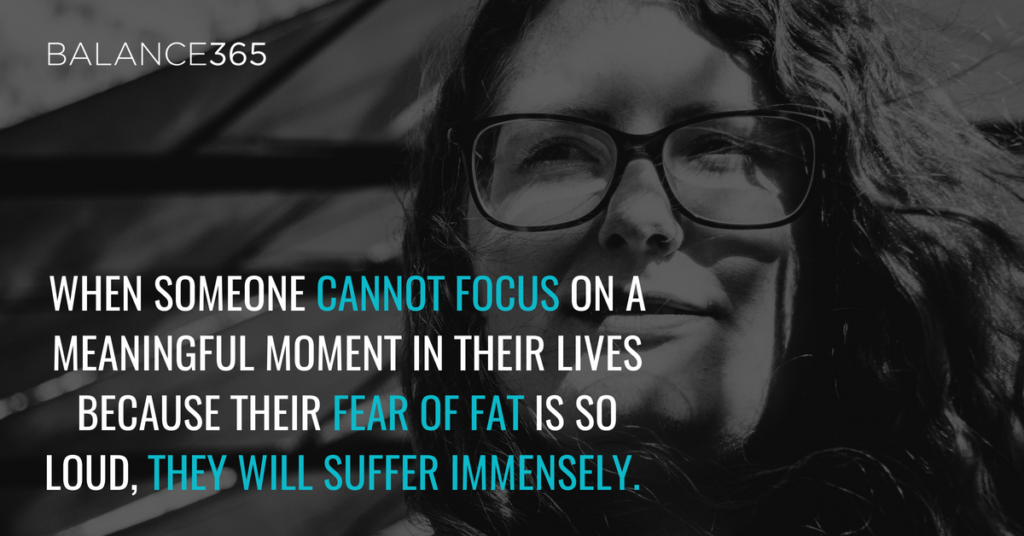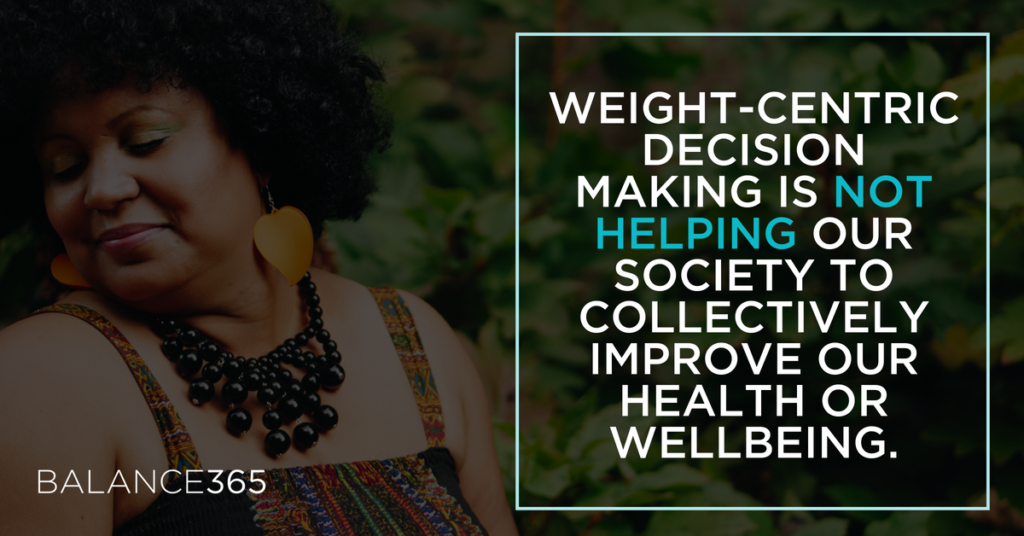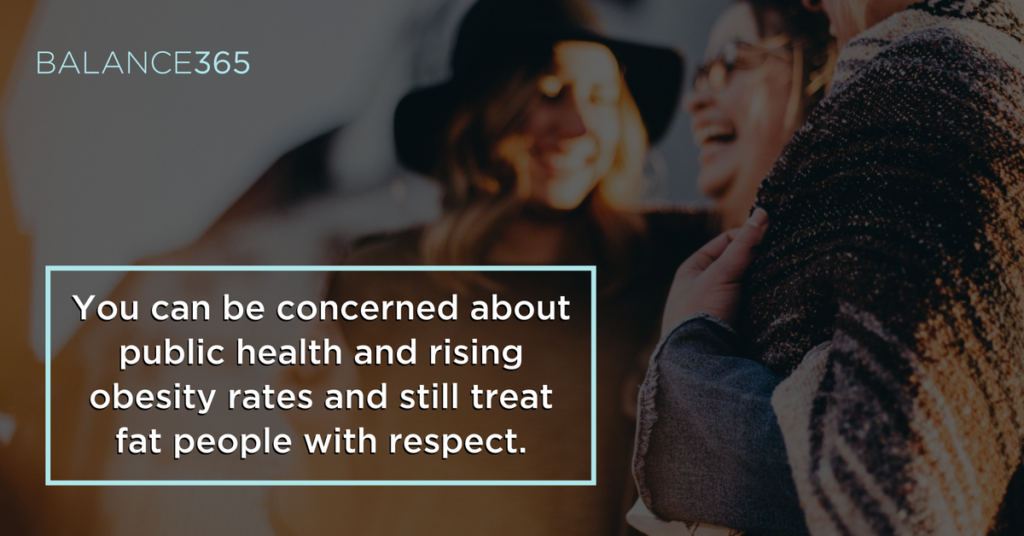If you cringed or found yourself thinking negative thoughts towards the larger bodies in the above picture, you may have issues with fatphobia.
This isn’t surprising, and it doesn’t make you a bad person. We live in a society that teaches fatphobia. People with small and large bodies both experience fatphobic thoughts and behaviours. You likely adopted this mindset in childhood and it could have come from a variety of places – your homelife, your community, the media you’ve consumed. At some point, someone planted a fatphobic thought in your mind and the environment you lived in validated it.
Fear not! We’re here to help expand your mind, and shed light on a toxic world-view that is hurting us all.
What is Fatphobia?
As explained by our recent podcast guest, Bethany Bellingham, fatphobia is a blanket term for a type of oppression that people with large bodies experience. Although we are all affected by fatphobia, we are affected at different levels and to different degrees. To understand this, we are sharing author and activist Virgie Tovar’s three levels of fatphobia. They are, as follows:
Intrapersonal Fatphobia – this is how an individual sees thxemselves. People of all body sizes can experience intrapersonal fatphobia. When someone cannot focus on a meaningful moment in their lives because their fear of fat is so loud, they will suffer immensely. The vast majority of people in our society are convinced that in order to fully participate in life, their bodies must look a certain way and be a certain size. People are mistakenly taught that weight and body shape are 100% in their control. Intrapersonal fatphobia can drive constant, self-deprecating, and self-destructive thoughts and behaviours.
Interpersonal Fatphobia – this is how an individual views and treats fat people. Only people of larger sizes experience interpersonal fatphobia, which comes as a result of public commentary and ill treatment of those in large bodies. Even though people in smaller body sizes may be personally suffering because of internalized fatphobia, they do not have to worry about or endure comments about their bodies, their lifestyle habits, or being turned down by a romantic partner. Living in this type of culture can make holidays, social gatherings, and eating in public very stressful for an individual with a large body, as they feel their choices and their size are under constant scrutiny from those around them.
Institutional Fatphobia – this is how someone is able to participate in the society they live in, including having a sense of belonging, having equal access to quality medical care, and seeing their bodies represented in the culture at large (media, literature, art). It also includes access to loving relationships and feeling as if the culture you live in is invested in your participation and existence. An example of institutional fatphobia would be if a person who is fat goes to the doctor with pain and leaves with a prescription to lose weight, rather than the medical treatment they need. Weight bias in health care is well documented.
Why Are We Addressing Fatphobia?
Fatphobia affects almost every member of our society. It’s our mission to help people live healthier, happier lives regardless of their body shape. On a higher level we hope to help foster a more inclusive world where there is space for everyone to explore building healthy habits that work for their physical, emotional and social health.
It’s very difficult to approach your health and wellness goals objectively with a fatphobic mindset. In fact, in our experience, an intense fear of fat or of becoming fat, can lead people to developing unhealthy habits such as: negative self talk, obsessive thoughts about food and exercise, pursuing fad diets, yo-yo’ing weight, restricting and bingeing, and attempting workouts that aren’t right for their bodies.
I see this frequently in my work with pregnant and postpartum women. There is sometimes a period of time where intense, high-impact activities may not be the healthiest choice for a pregnant or postpartum body (for example, if a woman is experiencing pelvic floor issues). A fatphobic mindset can make the pregnancy and postpartum period unnecessarily stressful for women. The natural changes in her body and the limitations she may have in exercise will destroy her self worth as her thoughts fixate on “the weight, the weight, the weight.”
Weight-centric decision making is not helping our society to collectively improve our health or wellbeing. If it did, we wouldn’t still be having this conversation, would we? We believe passionately that health-centric thinking that balances physical, emotional, and social health is a more realistic path to total wellness for all people.
Can Fat People be Healthy?
Yes.
They can also be unhealthy.
And thin people can be healthy.
But can also be unhealthy.
Our society has become obsessed with policing people’s nutrition and fitness choices, especially fat people’s choices. Many claim this is in the name of “health.” However, loneliness has a greater impact on a person’s health than their body size and I don’t see anyone policing people’s socializing habits!
It’s time to be blunt:
This policing of people’s lifestyle choices and discriminating against them because of their body size, is just another way to exert control over others and elevate the status of thin people in our society.
Did she just say that? Aaaaawkward.
Body size (or weight) is just one of MANY measures of how “healthy” a person is. Sometimes it’s a greater contributor to the overall picture, sometimes it’s a smaller contributor, and sometimes it’s useless.
With that being said…
It’s none of our business. People have a right to privacy when it comes to their health. Fat people don’t “owe” society any explanations. End of story.
“But, Obesity!”
You can be concerned about public health and “rising obesity rates” and still treat fat people with respect. I do. But you’ve got to start teasing out where your fat stigmas are at play and where you’re actually feeling compassion and wanting to improve society’s collective health.
Let’s pretend for a moment that weight isn’t a complex issue. Let’s pretend larger body weight is SOLELY the result of poor lifestyle habits (which is rarely the case).
Imagine you’re sitting in a busy food court and you see an old man with an oxygen tank struggling to get up a few steps. Most people would jump up to assist him. Now replace that man with a person who is fat struggling to get up a few steps. Most people would feel disgusted, turn away, some would even openly point and laugh.
The old man who made the choice to smoke cigarettes receives compassion and courtesy.
The person who is fat who made the choice to eat past his/her daily caloric needs receives ridicule and social isolation.
Both of these people made lifestyle choices that led to negative health outcomes. Both of them are suffering. Only one of them has to fear being ridiculed in public.
This is fatphobia. Uncomfortable yet?
Here is a simple solution: treat all people how you would want to be treated… With respect.
(PS – the term obesity is controversial. There is a whole medical field dedicated to studying it as a disease, but even that has been criticized. You can learn more about the debate here. I’m not here to help sway that decision, only to convince people that every member of our society should feel respected.)
How Can We Help People Be Healthy?
This is the RIGHT question to be asking, so thanks for sticking with me. If you are passionate about health and wellness, it’s time to start addressing other factors that contribute to a person’s health outcomes. Here are areas you can become an advocate for, so people large and small can live healthier, happier, longer lives:
- Equal access to quality healthcare
- Reduce the number of households living in poverty
- Better access/affordability of healthy, whole foods
- Less accessibility/less affordability of processed, convenience foods
- Increase in physical education/outdoor time in schools
- Restore home economics/cooking classes to schools
- Improve access to extra-curricular activities for communities
- Community cooking classes available in low SE neighbourhoods
- Improve walkability/bikeability in city planning
- Improve access and safety to parks and playgrounds
- Stricter regulations around advertising food to children
- Hold the diet industry accountable for wild and untrue claims
- Ditch fad diets and short term thinking, in favour of long-term habit change (if you need help with that, click here!)
There are millions of PROVEN ways you can get involved in improving the long term health of your community on a physical, emotional and social level without focusing on the weight of the individual in front of you. We’re doing this every day, in our private Facebook community.
Bottom Line: Fatphobia is Dangerous
Fatphobia is built on false beliefs and drives negative thoughts, feelings, and behaviours towards oneself and others. It leads to fat-shaming, extreme dieting and unsustainable exercise habits that are quickly abandoned. Fatphobia keeps people trapped in a cycle of restriction and weight swings, which is emotionally and physically damaging (not to mention exhausting). At it’s worst, fatphobia is contributing to people developing eating disorders, the prevalence having doubled since the 1960s.
At Healthy Habits Happy Moms, we’re committed to eradicating fatphobia. We have no goals for your body, because we think that is personal, and up to the individual themselves. But unlike many body-positive advocates, we aren’t opposed to talking about fat loss. We believe that long term fat loss is attainable for people who desire it, in a healthy and sane manner. We also believe people can change their nutrition and exercise habits without having a goal to change their shape or size. Because your body is your business.
We just want the world to stop trying (and failing) at the same old weight loss methods….


